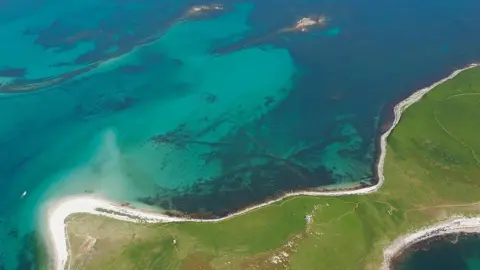Effect of rising sea levels 'unpredictable'
 Historic England Archive
Historic England ArchiveRising sea levels will affect coasts and societies in "complex and unpredictable" ways, a new study shows.
Researchers studied evidence covering 12,000 years of coastal changes in the Isles of Scilly, 28 miles off Cornwall.
They found the current cluster of 140 islands emerged from a single land-mass less than 1,000 years ago.
The report found examples through history of humans learning to adapt, rather than abandoning the islands that were changing due to sea level rises.
During a period between 5,000 and 4,000 years ago the land in the area was rapidly becoming submerged and people appeared to adapt to, rather than abandon, the new landscape.
 Historic England Archive
Historic England ArchiveThe reasons for this are unclear, but one possibility is that new shallow seas and tidal zones provided opportunities for fishing, shellfish collection and hunting wildfowl.
The team said with climate change now driving rapid sea-level rise, the effects will not always be as simple as a forced human retreat from coasts.
"When we're thinking about future sea-level rise, we need to consider the complexity of the systems involved, in terms of both the physical geography and the human response" said lead author Dr Robert Barnett, of the University of Exeter.
"The speed at which land disappears is not only a function of sea-level rise, it depends on specific local geography, landforms and geology.
"Human responses are likely to be equally localised. For example, communities may have powerful reasons for refusing to abandon a particular place."
The study was led by the University of Exeter in partnership with Cornwall Archaeological Unit, Cardiff University and 14 other institutes.
